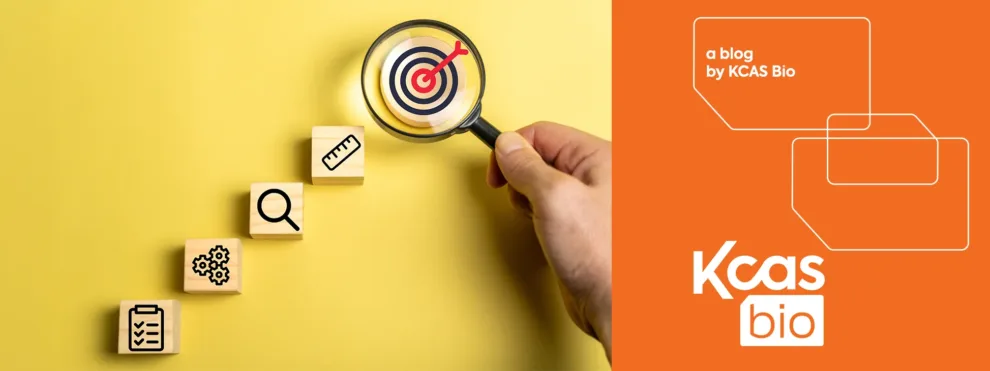In a bioanalytical CRO, method development is a critical step to ensure reliable and meaningful data that meets the client’s requirements. At our KCAS Bio – Lyon site, our method development team specializes in designing and optimizing ligand-binding assay (LBA) methods tailored to our clients’ specific objectives. While every project is different, our approach is structured, collaborative, and focused on delivering robust outcomes with regular communication with clients.
Why Method Development Matters
Prospects/Clients/Consultants come to us when:
- No LBA commercial kit exists for their target of interest.
- LBA commercial kits are available, but their performance does not meet the project’s requirements.
- They need to develop PK and ADA methods to support their (pre)clinical development.
- They have already struggled with another lab and are running out of solutions
In all cases, our role is to design tailored bioanalytical methods that can support reliable decision-making in drug development.
These methods typically fall into three categories: TK/PK (Toxicokinetics / pharmacokinetics), immunogenicity/ADA (anti-drug antibodies), or biomarker assays used to assess pharmacodynamics (PD) or drug efficacy.Beyond client projects, our team also drives internal R&D initiatives, aiming at improving existing processes, exploring new technologies, or tackling projects that require expertise beyond LBA, such as cell culture, cell-based assays, cytometry, or molecular biology.
The Team Behind the Work
Our development group at KCAS Bio – Lyon consists of four dedicated scientists, driven by curiosity, challenge, and the pursuit of innovative solutions:
- One Principal Scientist (PS), who leads the team, brings extensive experience in bioanalysis, and interacts directly with clients during project setup.
- Three Scientists, each with different backgrounds and areas of expertise, who carry out method development projects, with a hybrid position handling bench work as well as interactions with the sponsor.
The team is also supported by a Senior Scientific Advisor (SSA) and a director of operations, providing both guidance during weekly meetings and contributing scientific insight.
How Projects Begin
Before a project starts, the PS works closely with business development (BD) and SSA to:
- Understand the client’s scientific requirements.
- Define objectives and select the most appropriate platform.
- Draft proposals and prepare cost estimates.
Once the project is contracted, the PS, in agreement with the director of operations, assigns a scientist of the team as a project investigator (PI). Assignment considers workload, expertise.
A team briefing is held to align on scientific and client context, while a kick-off meeting with the sponsor defines the strategy, timelines, and communication plan, also serving to address any questions raised during internal discussions. At this stage, sourcing of critical reagents or rare matrices might impact on the project timeline – something we make sure to communicate clearly to sponsors.
A Flexible Approach to Study Design
After each experimental step, results are discussed internally, strategies are refined, and updated proposals are presented to the sponsor. Progress and results are shared regularly. At the end of each project, all results are presented in a slide deck, following a clear timeline and a cost-efficient approach.
This flexibility ensures we adapt to challenges as they arise, whether linked to the molecule, the matrix, the technology, or reagent availability.
A close partnership with the client, who best understands their drug and target, is key to finding effective solutions and continually inspires the team.
From First Experiments to Transfer
The typical development workflow follows a logical progression:
- Initial literature review and reagent sourcing.
- Screening and selection of the most suitable antibodies, proteins or assay format.
- Optimization of assay parameters (plates, buffers, dilutions, dynamic range).
- Performance evaluation (accuracy, precision, sensitivity, linearity).
- Pre-validation testing (robustness, reproducibility, changing operator). Analysts from the Validation & BA team are usually involved at this stage.
Once both the team and sponsor agree that the method meets performance expectations, it is transferred to the Validation & BA team. This transition includes:
- Training new analysts on the method.
- Handing over reagents and study material.
- A transfer meeting to ensure continuity with the sponsor.
If unexpected issues arise during validation, the method may return to development for further optimization, underscoring the importance of collaboration between teams.
Our Approach: Versatility, Proactivity, and Client-Focused Solutions
What sets our team apart is not only our technical expertise but also the way we work together and with our clients. Our members are highly versatile, allowing us to adapt quickly to different project needs. We maintain proactive communication with clients, addressing questions early and transparently, being proactive and reactive when challenges arise. Regular team brainstorming sessions help us solve problems and continuously improve our methods to better meet client requirements. Importantly, when results fall short of expectations or challenges arise, we always propose solutions to the client that aim to minimize impact on budget and timelines, a practice consistently praised by satisfied clients. Additionally, our lead times are very short in most cases, enabling us to respond quickly and efficiently to project demands.
Conclusion
Method development in bioanalysis is not a linear process. It requires scientific expertise, adaptability, and close communication with clients. At KCAS Bio – Lyon, our development team combines technical skills, structured collaboration, and flexibility to deliver methods that meet the highest standards while adapting to the unique challenges of each project.

